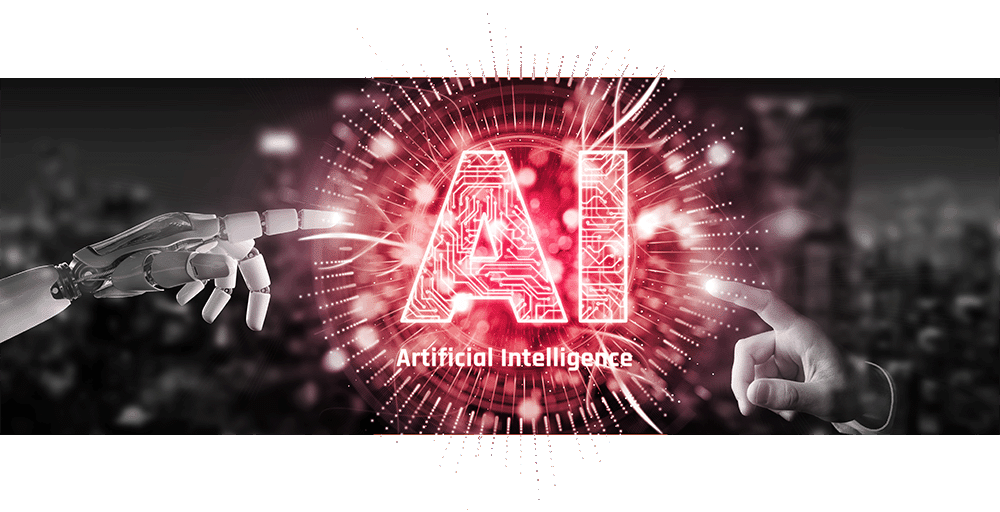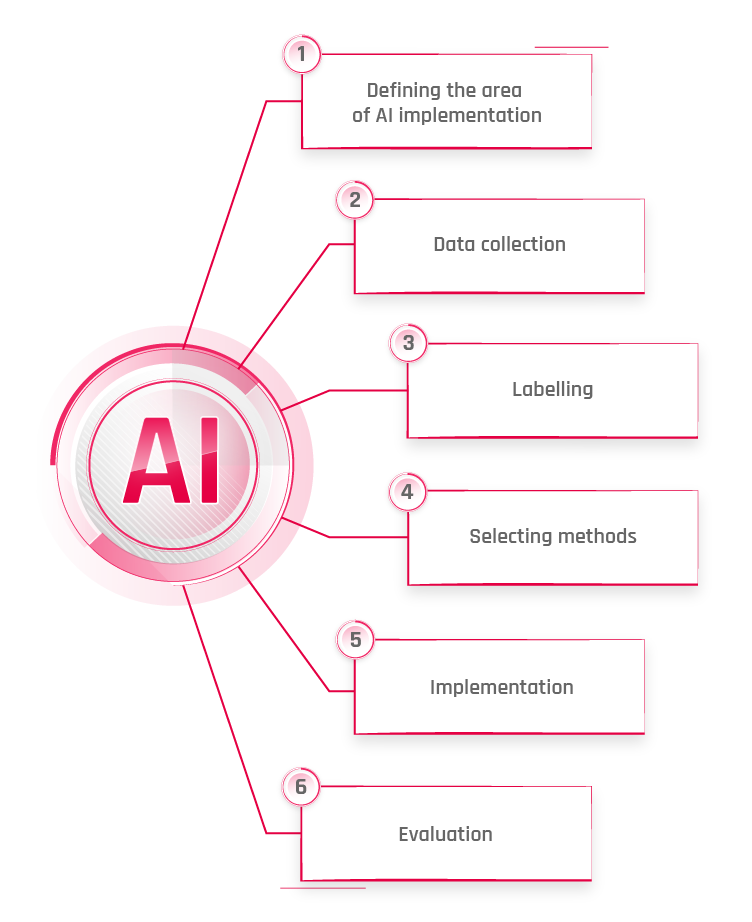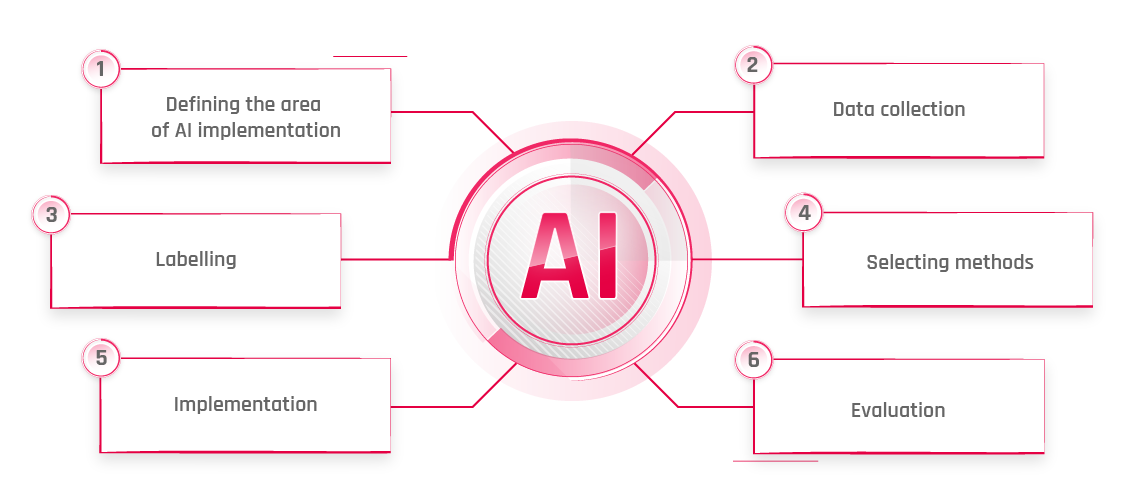Artificial Intelligence
Using Artificial Intelligence (AI) to solve problems is becoming easier every day and more within the reach of every company. By 2025, the global AI market will be worth more than $190 billion, and up to 97 percent of the largest multinational companies will implement AI-based solutions.[1]
Despite this, many smaller companies do not have the knowledge to develop a plan for applying AI in their business and assessing when the investment in such project will return. This is a huge challenge when you don’t have experience and experts in this field. That is why the most common solution chosen by companies is to establish cooperation with entities specializing in AI technology. The basic step to be taken before implementing solutions based on artificial intelligence is to understand what AI really is.
There is no single, universally valid definition of artificial intelligence.
Artificial intelligence can be defined as the imitation, by machines and computer systems, of the processes that determine human intelligence. It is the science of how to equip systems with certain characteristics of the human mind, such as the ability to understand language, recognize images, solve problems, and learn. The term “Artificial Intelligence” was used for the first time by John McCarthy, an American computer scientist, in 1956. He defined it as “the science and engineering of making intelligent machines.” Artificial intelligence research uses tools and findings from many fields, including computer science, psychology, philosophy, neuroscience, cognitive science, linguistics, operations research, economics, control theory, probability, optimization, and logic.[2] The term refers to the ability of machines to learn, make decisions, and exhibit human-like intelligence – for example, the ability to solve a problem on their own without using a human pre-programmed algorithm.[3]

Artificial intelligence creates technological potential that, when properly applied, can bring tangible results. Therefore, when thinking about introducing AI-based solutions, one should start by assessing what value AI can provide in particular areas in relation to existing tools.
AI is not a ready-made product that can be applied without prior preparation.
In recent years, there has been tremendous progress in simplifying access to AI technology and the tools that support it, resulting in faster and more efficient selection of appropriate solutions to the problems we face. We are seeing similar progress in the availability of computing power required to process data, whether locally or in the cloud. Still, AI is not an off-the-shelf product ready to use, like an antivirus program that you just buy and install. It’s an implementation process that requires preparation, expertise, and further development and optimization to produce satisfactory results.
Successful AI implementation requires a solid foundation, including, most importantly, the collection of large amounts of data. Once they are collected, it is essential to describe and categorize them properly. The next step is to select appropriate data processing methods. Finally, the results should be evaluated and compared with the state before the implementation of AI, which will show how much faster and more accurately we can perform tasks and how much it corresponds to previous assumptions.
Artificial Intelligence implementation process
AI will have the same impact on people like electricity or the Internet.
It will change the functioning of many industries, including manufacturing, commerce, marketing, education, transportation or finance. The European Parliament has already established a Special Committee on Artificial Intelligence in the Digital Age (AIDA) to study the future impact of artificial intelligence on the EU economy. Artificial intelligence is already improving healthcare, enhancing safety in transport and making products and services more personalized to their users. It is also having a huge impact on everyday work, which is becoming safer and more efficient.
In Poland, Microsoft’s “AI & Skills” study showed that more than 80% of advanced AI users see its tangible value for their business. Leaders in the use of AI also feel that this technology highly influences the efficiency of operational processes. In the case of Polish respondents this is 89% of indications. They also perceive that AI influences their innovativeness in terms of developing new products and services. This was confirmed by 62% of representatives of domestic organizations.[5]
Artificial intelligence is becoming one of the foundations of Industry 4.0 and is no longer perceived as a mysterious concept straight out of science-fiction movies. It already occupies an increasingly important place in modern factories. An excellent example of that can be the innovative device, patented by DTP – Wire Label Reader, which, thanks to the use of AI technology, allows to reduce the time of installation of control cabinet wiring from 25 to 82%.[6] Are you wondering whether to invest in solutions based on artificial intelligence? Our answer is definitely YES!
DTP helps companies implement AI solutions.
Together we look for areas with the potential to use artificial intelligence, we provide services from data collection and its description to the selection of methods and evaluation of the results. We support both in the individual stages and in the implementation of the entire solution, according to customer guidelines. We focus on areas that have the greatest potential, not only for the widest application, but also where the obtained financial effects (savings or profits) will be the greatest. If you don’t know yet whether the application of AI is for you or you don’t know how to implement artificial intelligence in your business – Digital Technology Poland will help you find an appropriate solution.
[1] PARP – By 2025 Poland will need about 200,000 specialists dealing with artificial intelligence
[2] PARP – Monitoring trends in innovation
[3] McKinsey – Revolution AI, How artificial intelligence will change business in Poland
[4] European Parliament – Artificial Intelligence: opportunities and threats
[5] Microsoft – AI motivates companies to improve employees’ skills
[6] Energies – Application of the Deep CNN-Based Method in Industrial System for Wire Marking Identification


